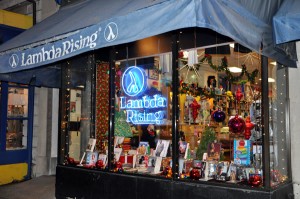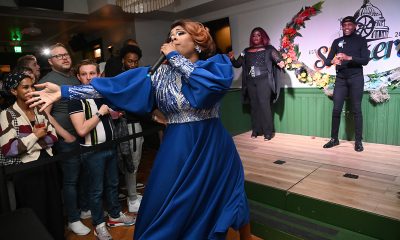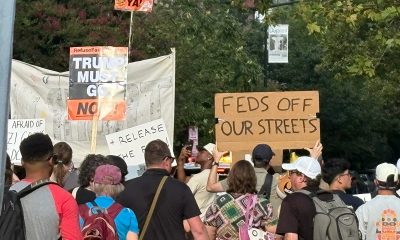Local
End of an era, as Lambda Rising to close
Lambda Rising, a bookstore serving the LGBT community in the nation’s capital for 35 years, is closing its D.C. store in Dupont Circle and its remaining out-of-town store in Rehoboth Beach, Del., in January.
The closings, announced last week, become another in a series of gay bookstores that have shut down in recent years in other cities, including New York and Baltimore.
Deacon Maccubbin, 66, the store’s founder and co-owner, told D.C. Agenda in an exclusive interview that he plans to retire soon and that he and co-owner Jim Bennett, his domestic partner of 32 years, decided they would rather close the stores than sell them to a new owner who might change their focus and mission.
“The phrase ‘mission accomplished’ has gotten a bad rap in recent years but in this case, it certainly applies,” Maccubbin said.
“When we set out to establish Lambda Rising in 1974, it was intended as a demonstration of the demand for gay and lesbian literature,” he said, noting that few if any mainstream bookstores and newsstands carried gay-related books and periodicals at the time.
“Today, 35 years later, nearly every general bookstore carries GLBT books, often featuring them in special sections,” he said.
Maccubbin said the Internet also enables people today to access LGBT-related information from almost any location in the country, accomplishing yet another part of Lambda Rising’s mission: to provide up-to-date information to a community that could not obtain it elsewhere.
He said he first opened the store in June 1974 in a converted townhouse on 20th Street, N.W., near Dupont Circle, with an initial investment of $3,000 and an additional $1,000 borrowed from a local gay activist. The shop consisted of 300 square feet of space and just 250 gay and lesbian book titles.
“That’s all there were at the time,” Maccubbin said.
The store, along with the LGBT community and gay civil rights movement, grew dramatically over the next three decades, moving in 1977 to a larger storefront space on S Street, N.W., a few blocks away. In 1984, the store moved to its current location at 1625 Connecticut Ave., N.W., in a storefront building that Maccubbin and Bennett own.
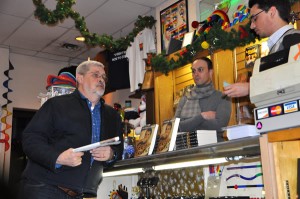
Lambda Rising, which opened in 1974, will close in January as its owners prepare to retire. (DC Agenda photo by Aram Vartian)
In the intervening years, the two opened branches of the store in Baltimore, Norfolk, Va., and Rehoboth Beach. In 2003, Lambda Rising bought the Oscar Wilde Bookshop in New York’s Greenwich Village, recognized as the nation’s first gay bookstore, having opened in 1967. Maccubbin said Lambda Rising bought that store to save it from closing.
After more than three years of helping rebuild the Oscar Wilde store, Lambda Rising sold it to its manager, to return it to its status as a locally owned business. But earlier this year, due to the national economic downturn, the New York owner said he was forced to close the store.
In its three decades of operation, Lambda Rising became one of the nation’s first gay businesses to advertise in mainstream publications and the first to advertise on TV in the 1970s. It has brought in hundreds of authors to its various store branches, including Andy Warhol, Sandra Bernhard, Armistead Maupin and Rita Mae Brown.
“Closing the store now will certainly leave something of a hole in Washington’s literary and political scene, and even though I’m excited about the opportunities that will open up for us as we move into the next phase of our life, there is a bittersweet component to it all,” said Maccubbin.
“But the book market has been changing dramatically, the GLBT community has been making progress by leaps and bounds, and 35 years is enough time for any person to devote to any one thing,” he said. “It’s just time to move on.”
Maccubbin said he and Bennett are happy to offer advice and support for someone interested in opening another LGBT bookstore in Washington.
Veteran D.C. gay activist Frank Kameny, who described himself as a loyal customer of Lambda Rising since it opened, said Maccubbin and the store deserve “enormous credit” as a nationally recognized gay community resource.
But he said he regrets that at least one aspect of the store’s mission has not been accomplished.
“No non-gay bookstore that I know of has a gay section with content remotely comparable to that of Lambda Rising,” he said. “And many of the publications found there will be unavailable elsewhere. Lambda Rising will be truly missed. Progress is often sad.”
Rick Rosendall, vice president of the Gay & Lesbian Activists Alliance, called Lambda Rising a “landmark” for the LGBT community.
“It will certainly be a major loss for our community,” he said.
Maccubbin said the store will begin a holiday sale as early as this weekend for many of its books and other products, such as gifts items. He said a “huge liquidation sale” will begin immediately after Christmas, with the store expected to close in early January.
District of Columbia
Ruby Corado sentenced to 33 months in prison
Former Casa Ruby director pleaded guilty to wire fraud in 2024
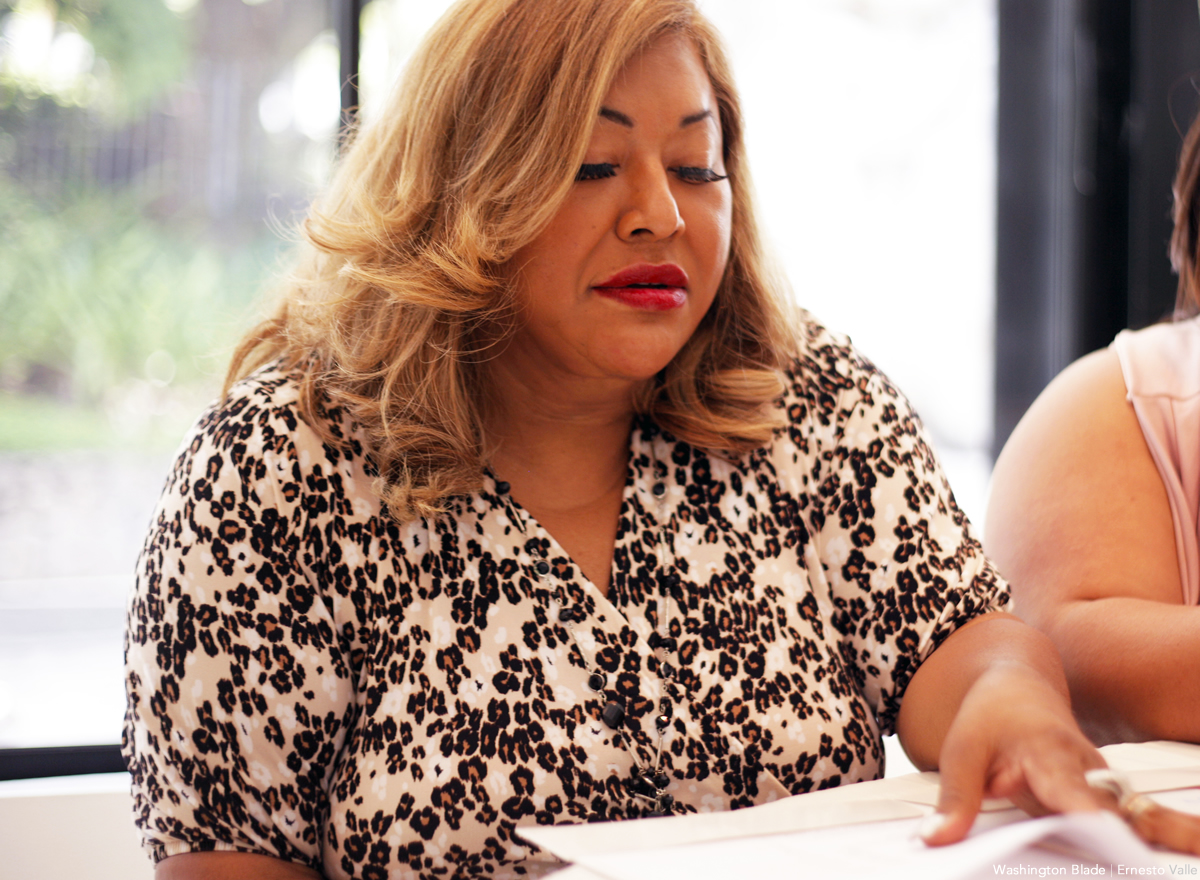
A federal judge on Jan. 13 sentenced Ruby Corado, the founder and former executive director of the now closed D.C. LGBTQ community services organization Casa Ruby, to 33 months of incarceration for a charge of wire fraud to which she pleaded guilty in July 2024.
U.S. District Court Judge Trevor M. McFadden handed down the sentence that had been requested by prosecutors with the Office of the U.S. Attorney for the District of Columbia after Corado’s sentencing had been postponed six times for various reasons.
The judge also sentenced her to 24 months of supervised release upon her completion of incarceration.
In addition to the sentence of incarceration, McFadden agreed to a request by prosecutors to hold Corado responsible for “restitution” and “forfeiture” in the amount of $956,215 that prosecutors have said she illegally misappropriated from federal loans obtained by Casa Ruby.
The charge to which she pleaded guilty is based on allegations that she diverted at least $180,000 “in taxpayer backed emergency COVID relief funds to private offshore bank accounts,” according to court documents.
Court records show FBI agents arrested Corado on March 5, 2024, at a hotel in Laurel, Md., shortly after she returned to the U.S. from El Salvador, where authorities say she moved in 2022. Prosecutors have said in charging documents that she allegedly fled to El Salvador, where she was born, after “financial irregularities at Casa Ruby became public,” and the LGBTQ organization ceased operating.
Shortly after her arrest, another judge agreed to release Corado into the custody of her niece in Rockville, Md., under a home detention order. But at an Oct. 14, 2025, court hearing at which the sentencing was postponed after Corado’s court appointed attorney withdrew from the case, McFadden ordered Corado to be held in jail until the time of her once again rescheduled sentencing.
Her attorney at the time, Elizabeth Mullin, stated in a court motion that her reason for withdrawing from the case was an “irreconcilable breakdown in the attorney-client relationship.”
Corado’s newly retained attorney, Pleasant Brodnax, filed a 25-page defense Memorandum in Aid of Sentencing on Jan. 6, calling for the judge to sentence Corado only to the time she had already served in detention since October.
Among other things, Brodnax’s defense memorandum disputes the claim by prosecutors that Corado improperly diverted as much as $956,215 from federally backed loans to Casa Ruby, saying the total amount Corado diverted was $200,000. Her memo also states that Corado diverted the funds to a bank account in El Salvador for the purpose of opening a Casa Ruby facility there, not to be used for her personally.
“Ms. Corado has accepted responsibility for transferring a portion of the loan disbursements into another account she operated and ultimately transferring a portion of the loan disbursements to an account in El Salvador,” the memo continues.
“Her purpose in transferring funds to El Salvador was to fund Casa Ruby programs in El Salvador,” it says, adding, “Of course, she acknowledges that the terms of the loan agreement did not permit her to transfer the funds to El Salvador for any purpose.”
In his own 16-page sentencing recommendation memo, Assistant U.S. Attorney John Borchert, the lead prosecutor in the case, said Corado’s action amounted at the least to fraud.
“The defendant and Casa Ruby received no less than $1.2 million in taxpayer backed funds during the COVID-19 global health crisis,” he memo states. “But rather than use those funds to support Casa Ruby’s mission as the defendant promised, the defendant further contributed to its demise by unlawfully transferring no less than $180,000 of these federal emergency relief funds into her own private offshore bank accounts,” it says.
“Then, when media reports suggested the defendant would be prosecuted for squandering Casa Ruby’s government funding, she sold her home and fled the country,” the memo states. “Meanwhile, the people who she had promised to pay with taxpayer-backed funds – her employees, landlord, and vendors – were left behind flat broke.”
A spokesperson for the U.S. Attorney’s office and Corado’s attorney didn’t immediately respond to a request from the Washington Blade for comment on the judge’s sentence.
“Ms. Corado accepts full responsibility for her actions in this case,” defense attorney Brodnax says in her sentencing memo. “She acknowledges the false statements made in the loan applications and that she used some of the money outside the United States,” it says.
“However, the money was still utilized for the same purpose and intention as the funds used in the United States, to assist the LGBTQ community,” it states. “Ms. Corado did not use the money to buy lavish goods or fund a lavish lifestyle.”
Brodnax also states in her memo that as a transgender woman, Corado could face abuse and danger in a correctional facility where she may be sent if sentenced to incarceration.
“Ruby Corado committed a crime, she is now paying the price,” said D.C. LGBTQ rights advocate Peter Rosenstein. “While it is sad in many ways, we must remember she hurt the transgender community with what she did, and in many ways they all paid for her crime.”
Virginia
Woman arrested for anti-gay assault at Alexandria supermarket
Victim recorded video of Christmas Day attack

Alexandria police announced on Jan. 12 that a Maryland woman has been arrested for allegedly assaulting a man while shouting anti-gay slurs at him at a Giant supermarket in Alexandria on Christmas Day.
The arrest came after a video of the assault that the victim captured with his phone and on which the woman can be heard shouting anti-gay slurs went viral on social media.
Police identified the woman as Shibritney Colbert, 34, of Landover, Md. Alexandria Police Chief Tarrick McGuire stated at a news conference that police responded to a 911 call placed by the victim and attempted to apprehend the woman, but she drove off in her car before police could apprehend her.
He said following an investigation, Colbert was apprehended and arrested in Prince Goerge’s County, Md., on Jan. 8. He said arrangements were being made for her to be brought to Alexandria where she was expected to face charges of assault and battery, destruction of property, felony eluding, and driving an unregistered vehicle.
The video of the incident shows Colbert pushing a shopping cart she was using in an aisle at the Giant store, located at 3131 Duke St., into the victim and another woman who was trying to help the victim. She can be seen throwing groceries at the victim while shouting anti-gay names. “Boy, get out of here with your gay ass,” was among the words she yelled at him that could be heard on the video.
The victim, who police identified only as a 24-year-old man, could be heard on the video saying he does not know the woman and urging her to “please back up.”
“Based on the victim’s statement, comments exchanged prior to the assault, and the totality of the circumstances, investigators believe the victim was targeted because of his sexual orientation,” police said in a statement.
Tarrick said Colbert’s arrest came at a time when Alexandria police were completing a strengthened hate crime policy calling for detectives to investigate crimes based on hate and for the department to prepare reports on hate crimes twice a year.
“Hate crimes are not just crimes against individuals, they are offenses that threaten the entire community and undermine the fundamental principles of dignity, equality, and safety,” Tarrick said.
Alexandria police didn’t immediately respond to a request from the Washington Blade for a copy of the official police report on the incident.
A link to the video posted on the social media site Reddit in which an unidentified man provides some details of the attack, can be accessed here:
Virginia
Mark Levine running in ‘firehouse’ Democratic primary to succeed Adam Ebbin
Outgoing gay Va. state senator has endorsed Elizabeth Bennett-Parker
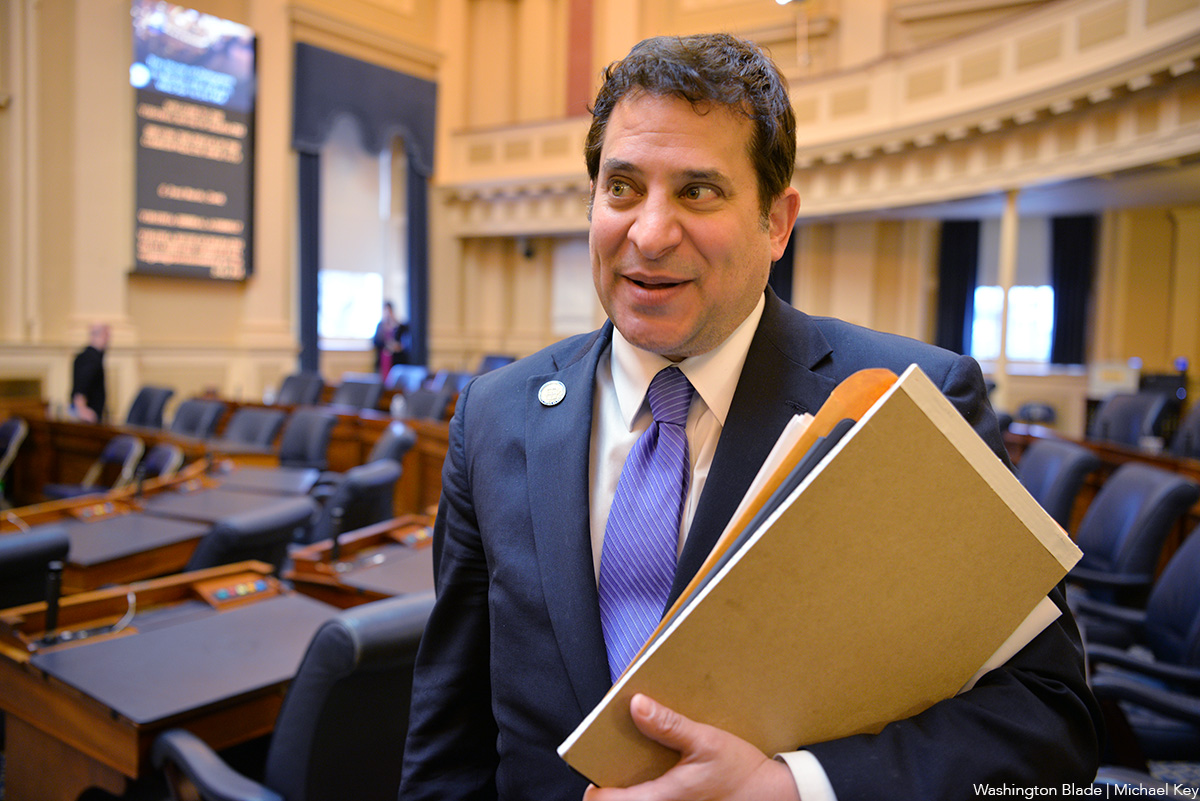
Gay former Virginia House of Delegates member Mark Levine (D-Alexandria) is one of four candidates running in a hastily called “firehouse” Democratic primary to be held Tuesday, Jan. 13, to select a Democratic nominee to replace gay state Sen. Adam Ebbin (D-Alexandria)
Ebbin, whose 39th Senate District includes Alexandria and parts of Arlington and Fairfax Counties, announced on Jan. 7 that he was resigning effective Feb. 18, to take a job in the administration of Gov.-elect Abigail Spanberger.
The Jan. 13 primary called by Democratic Party leaders in Alexandria and Arlington will take place less than a week after Ebbin announced his planned resignation.
According to the Community News of Alexandria publication, a public debate between the four candidates was scheduled to take place one day earlier on Monday, Jan. 12, from 7-9 p.m. at the Charles Houston Recreation Center in Alexandria.
The winner of the so-called firehouse primary will compete in a Feb. 10 special election in which registered voters in the 39th District of all political parties and independents will select Ebbin’s replacement in the state Senate.
The other candidates competing in the primary on Tuesday, in addition to Levine, include state Del. Elizabeth Bennett-Parker, former Alexandria Vice Mayor Amy Jackson, and World Wildlife Fund executive Charles Sumpter.
Another Alexandria news publication, ALXnow, reports that Ebbin, Spanberger, and at least four other prominent Democrats in the Virginia General Assembly have endorsed Bennett-Parker, leading political observers to view her as the leading contender in the race.
“I have worked alongside Elizabeth and have seen her fight for the values of our community,” Ebbin said in a statement, ALXnow reports.
Arlington gay Democratic activist TJ Flavall said Parker-Bennett has attended LGBTQ community events and is known as an LGBTQ ally.
Ebbin’s endorsement of Bennett-Parker over fellow gay politician Levine in the Jan. 13 firehouse primary follows what observers have said is a longstanding rivalry between the two over disagreements around legislative issues.
In 2021, Ebbin endorsed Parker-Bennett when she challenged Levine in the Democratic primary for his House of Delegates seat in the then 45th House District in Alexandria.
Parker-Bennett defeated Levine in that race at a time when Levine, in an unusual move, also ran for the position of lieutenant governor. He also lost that race.
ALXnow reports that in his Facebook announcement of his candidacy for Ebbin’s state Senate seat Levine discounted the relevance of the large number of prominent endorsements that Parker-Bennet has received. In campaigns that last for just a few days rather than weeks or months, “it’s about turnout,” ALX now quoted him as saying.
Levine, an attorney, has a longstanding record as an LGBTQ rights advocate. He worked as a legislative counsel to gay former U.S. Rep. Barney Frank (D-Mass.) before becoming a radio talk show host and TV political commentator in Virginia prior to his election to the Virginia House of Delegates.
The firehouse primary on Jan. 13, which is open only to voters with identification showing they live in the 39th District, will take place from 8:30 a.m. to 7 p.m. in these locations:
Alexandria: Charles E. Beatley, Jr. Public Library, 5005 Duke St.; and the Charles Houston Recreation Center, 901 Wythe St.
Arlington: Aurora Hills Library, 735 18th St. S.
Annandale: New John Calvin Presbyterian Church, 6531 Columbia Pike

